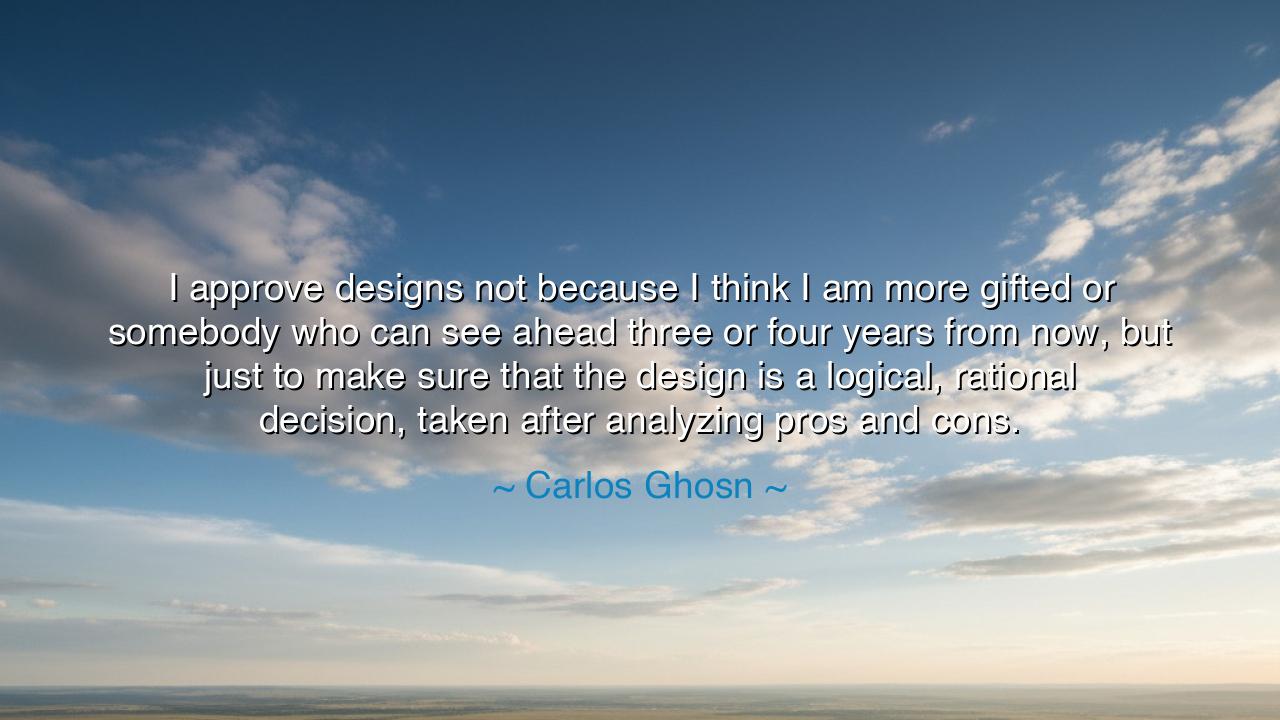
I approve designs not because I think I am more gifted or
I approve designs not because I think I am more gifted or somebody who can see ahead three or four years from now, but just to make sure that the design is a logical, rational decision, taken after analyzing pros and cons.






Hearken, children of the earth, and ponder the words of Carlos Ghosn: “I approve designs not because I think I am more gifted or somebody who can see ahead three or four years from now, but just to make sure that the design is a logical, rational decision, taken after analyzing pros and cons.” In these words lies a meditation on leadership, humility, and the discipline of reason. The ancients knew that mastery was not the gift of prophecy, but the practice of judgment—the ability to discern truth through method, reflection, and balance.
Ghosn speaks as one who understands that true power lies not in arrogance, but in clarity of thought. The wise leader does not govern by instinct alone, nor by blind confidence in talent. He governs through reason, through examination of consequence, and through the patient weighing of alternatives. The ancients taught that wisdom begins when pride ends. The commander who wins battles is not the one who believes himself invincible, but the one who foresees risk, studies terrain, and measures every step with discipline.
In his reflection, Ghosn reveals the soul of the rational craftsman—the one who seeks not to dominate creation, but to guide it toward harmony and function. To make a logical and rational decision is to align thought with reality, to ensure that the design serves purpose rather than vanity. Just as the architects of the Parthenon calculated every column and curve for strength, beauty, and proportion, so too must every creator analyze both pros and cons, for perfection is born not from passion alone, but from the marriage of inspiration and reason.
Consider the life of Leonardo da Vinci, the great artist-engineer of Florence. He, too, was filled with vision, yet tempered his imagination with study—of anatomy, geometry, physics, and perspective. His genius was not divine chance, but disciplined observation. Each design he produced, from flying machines to fortresses, was shaped by curiosity governed by logic. Like Ghosn, Leonardo knew that creation untested by reason becomes chaos, and that to design well is to think deeply.
Ghosn’s humility also reveals a truth about leadership and trust. The wise leader does not claim omniscience; he surrounds himself with capable minds, listens to counsel, and ensures that decisions rest on analysis, not ego. He plays not the prophet, but the guardian of process. The ancients called such a leader “archon of measure”—one who rules not by divine certainty, but by steadfast moderation. For it is reason, not pride, that builds enduring legacies.
The lesson is clear: in every endeavor—whether design, governance, or creation—success belongs not to those who boast of vision, but to those who reason through uncertainty, who test assumptions, and who temper inspiration with discipline. Logic is not the enemy of creativity, but its foundation; humility is not weakness, but the soil in which wisdom grows.
Practical wisdom flows from this teaching. When faced with choices, examine each carefully. Consider both the promise and the peril of your path. Listen to others, especially those who challenge you, and let truth, not pride, be your compass. Cultivate a mind that seeks understanding before judgment, and train your reason as diligently as an athlete trains his body. In this way, your actions will bear the mark of wisdom, not whim.
Thus, let the generations to come carry this wisdom: reason is the architect of progress, humility its cornerstone, and analysis its instrument. Carlos Ghosn reminds us that greatness is not foresight alone, but the discipline to question, measure, and decide rightly. To lead with clarity is to honor both the gift of thought and the responsibility of creation—to build not merely for the moment, but for all time.






AAdministratorAdministrator
Welcome, honored guests. Please leave a comment, we will respond soon